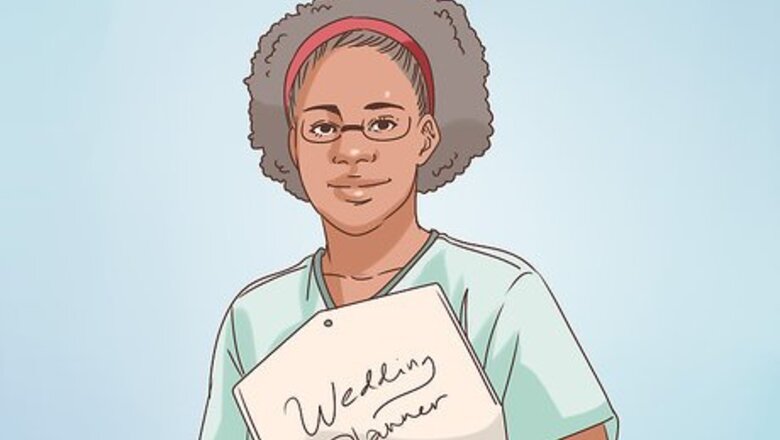
views
Planning the Event

Consider hiring a wedding planner. If you’re expecting to have a large budget for your wedding, consider hiring a full-time wedding planner. Your wedding planner will help you make a budget, book vendors, and keep you on schedule. If you’re worried about budget concerns, consider hiring a part-time coordinator to help with wedding details or a day-of coordinator to help at the wedding. If you don’t want to hire a planner, find a comprehensive wedding checklist online to help you stay organized. EXPERT TIP Hope Mirlis Hope Mirlis Wedding Officiant & Marriage Counselor Hope Mirlis is a registered Wedding Officiant, an Ordained Non-Denominational Minister, and a Certified Yoga Instructor specializing in pre-wedding mental health. She is the Founder of A More Perfect Union, a premarital counseling business. She has worked as a counselor and officiant for over eight years and has helped hundreds of couples strengthen their relationships. She has a MFA in Dramatic Arts from the University of California, Davis. Hope Mirlis Hope Mirlis Wedding Officiant & Marriage Counselor A wedding planner can give you peace of mind. Wedding officiant Hope Mirlis says: "Having a wedding planner, especially a day-of planner, means you don't have to worry about a lot of the nitty gritty things, like where the guests should put gifts, who has the unity candles or supplies for the ceremony, or gathering friends or family for photos.”
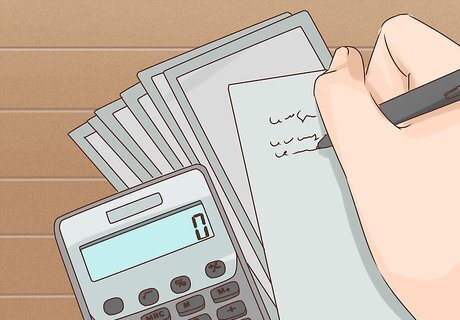
Create a realistic budget. Weddings can be very expensive, especially if you don’t do the proper budget planning. For example, some people overspend because they invited more people than they could afford. Do thorough research by using online wedding calculators and talking to vendors to make sure you stay within your budget. Budget considerations include: The number of guests you and your fiance(e) will invite How much to spend on invitations How much to spend on bridal wear and grooms wear. How much to spend on flowers (including the bride's bouquet and groom's boutonniere) Where the wedding ceremony and reception will take place and how much to spend How much to spend on the meal and/or wedding cake Whether or not to hire a professional photographer How much to spend on entertainment How much to spend on the honeymoon
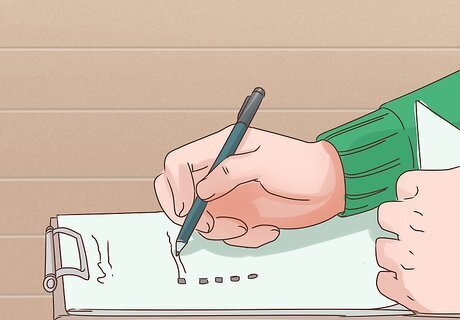
Create a guest list. The number of people you invite to your wedding will affect the kinds of venues you can use. Therefore, you need to create a guest list as soon as possible. Keep in mind that you may need to reduce the number of people you’re inviting if you can’t find a venue within your budget. When choosing people for your guest list, ask yourself: Is this person a member of my family? Have I spoken to this person within the last year? Do I want children at my wedding? Do I want animals at my wedding? Will this person be offended if I don’t invite them?

Reserve a wedding venue. Popular and affordable wedding venues can fill up months in advance. Therefore, as soon as you have a tentative guest count, you need to go find a place to get married. Visit several different locations to find the right place for your wedding. While you’re looking, consider: What time of day is the wedding? Does the venue look nice at that time? Is the venue a full-service venue? Will they provide chairs, tables, and linens? Is this venue big enough for my entire guest list? Does this venue require a deposit? Can I afford it?
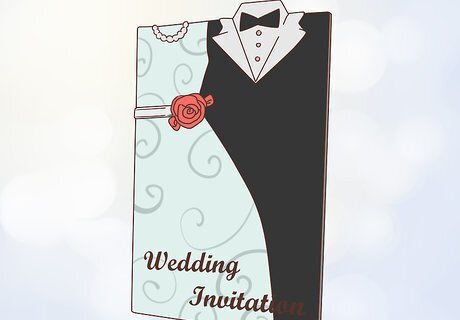
Send wedding invitations. Once you’ve booked your venue, you can send out wedding invitations. Talk to a printing shop or go online to find wedding invitation services. Include the date and time, RSVP information, the ceremony location (if separate from the reception,) and the dress code. Some people also like to include their registry information. Most people send out invitations six to eight weeks before the wedding. If your wedding is more than six months away, consider sending a “Save the Date” announcement instead. Send out the invitations closer to your wedding date.
Booking Vendors

Choose your vendors in advance. A wedding vendor is anyone who provides a service for the wedding. When talking to potential vendors, make sure you fully understand their pricing and packages. You want to know up front if there are any hidden fees. Examples of potential vendors include: Florists Photographers Bartenders (if your catering service doesn’t provide them) A DJ or wedding band EXPERT TIP "Your wedding planner can help you find experienced vendors who really fit your vision for the day." Hope Mirlis Hope Mirlis Wedding Officiant & Marriage Counselor Hope Mirlis is a registered Wedding Officiant, an Ordained Non-Denominational Minister, and a Certified Yoga Instructor specializing in pre-wedding mental health. She is the Founder of A More Perfect Union, a premarital counseling business. She has worked as a counselor and officiant for over eight years and has helped hundreds of couples strengthen their relationships. She has a MFA in Dramatic Arts from the University of California, Davis. Hope Mirlis Hope MirlisWedding Officiant & Marriage Counselor

Find an officiant. The officiant is the person that will lead your wedding ceremony. Usually, a religious leader or Justice of the Peace would fill this role. However, it’s become popular to have a close friend or family member officiate the wedding. Depending on where you live, there may be special laws dictating who you can use as a wedding officiant. A friend or family member may have to become ordained before officiating your wedding. When choosing a wedding officiant, make sure you talk about getting a marriage license.

Reserve a caterer. If you’re planning on serving food at your wedding, you will need to reserve a caterer. Ask any representatives from your venue if they have any recommendations. These vendors will be familiar with the venue and its staff. When talking to potential vendors, ask questions such as: “Are you available on the date of my wedding?” “Are you legally able to serve alcohol?” “Do your prices include the costs of servers and bartenders?” “Do you have any price minimums I’m required to meet?” “Can you provide rentals such as tables, chairs, and linens?”

Select and order your cake. Depending on your wedding cake budget, you may want to order your cake a few months in advance. This will allow you to talk about several different cake designs with the baker and even taste some cake samples. Keep in mind that large, complicated cakes are usually quite expensive. When choosing a baker, look at their portfolio to be sure that you like their work. If the baker can’t deliver the cake to the wedding, designate a trusted family member to pick it up on the day-of.
Keeping Costs Down
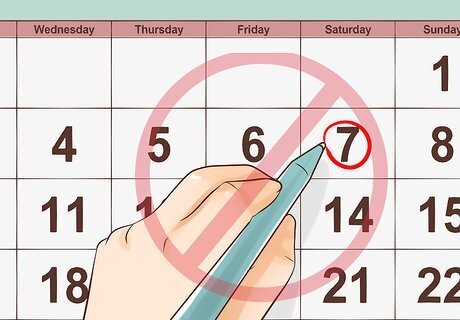
Don’t have your wedding on a Saturday. Most venues charge less money for Sundays than they do for other days of the week. You can potentially save thousands of dollars by moving the wedding to an unusual day. Popular alternative times include: Sunday afternoon Friday evening Sunday morning
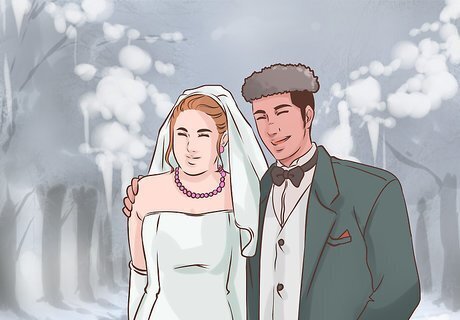
Have a winter wedding. Most venues and vendors charge less money between December and March. Additionally, many vendors that might be fully booked during the wedding season will be available. Take advantage of this by having a winter wedding. Winter weddings are usually held indoors because of cold weather. If your preferred venue is outdoors, hold your wedding in the spring or summer.

Keep your guest list small. The less people you invite, the less money you’ll have to spend on food, alcohol, and chair rentals. If you’re having trouble keeping your guest list short, try limiting your guest list to family and close friends. Smaller weddings are usually more intimate than larger weddings.

Serve simple food. Resist the temptation to splurge on an elaborate four course meal. Instead, serve a small buffet with entrees and appetizers. If your wedding will be held in the evening, skip the entrees altogether and serve appetizers and small desserts instead. If you won’t be serving a full meal, you should indicate that on the invitation. For example, write “Appetizers and sweets will be served at the reception."
Looking Perfect
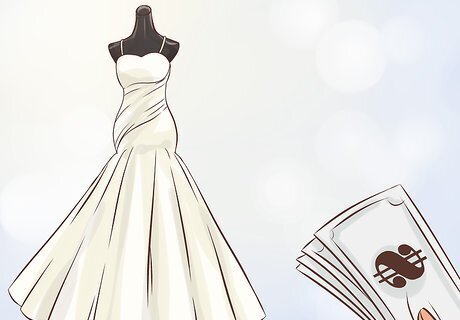
Purchase a wedding dress. Buy your dress a few months in advance to allow time for alterations. Additionally, choose a dress that flatters your body type and fits in with your wedding vision. For example, if you’re getting married in a ballroom, you may not want to wear a simple shift dress. If you’re having trouble choosing a dress, bring some close friends or family members along to help you choose. Purchase wedding shoes that match your dress. Many bridal boutiques also offer bridesmaid dresses. If possible, you can kill two birds with one stone by shopping for bridesmaids dresses at the same time.
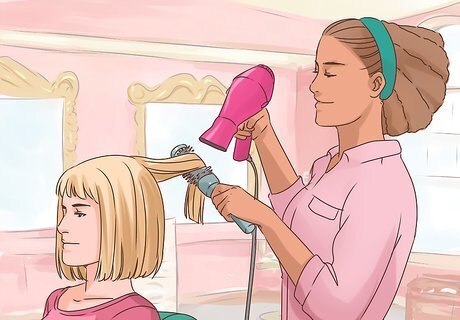
Get any beauty treatments done ahead of time. Avoid getting beauty treatments the day before the wedding. If you have an adverse reaction, you won’t have time to recover from any rashes or swelling. Instead, get these treatments done a week or two before the wedding. Beauty treatments can include: Hair waxing Eyebrow shaping Facials and other skin treatments Hair coloring
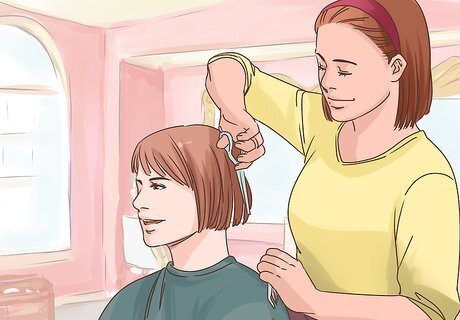
Consider booking professional beauticians. If you have room in your budget, consider getting your hair and makeup done professionally. A professional makeup artist will be able to give you a flawless look that will last all day. Similarly, a professional hair stylist can do your hair quickly and securely. If possible, book “in home” services that will allow the stylists to come to you. With some practice, you can also do your own hair and makeup.
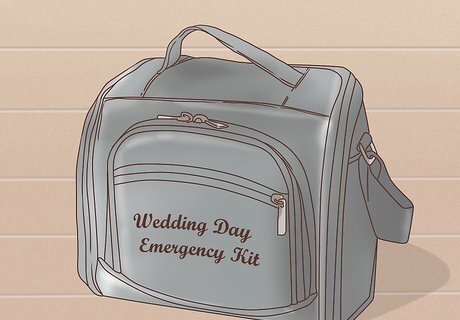
Bring an emergency bag to the wedding. An emergency bag will help correct any wardrobe, makeup, or hair problems that may occur throughout the wedding. If you don’t have time to assemble this bag yourself, ask a trusted friend or family member to assemble it for you. This emergency bag can include: Spare makeup for touch-ups Deodorant Headache medicine Breath mints A small sewing kit

Smile. No matter how beautiful your dress, makeup, and hair are, you won’t look good without a smile. However, after an hour or two of posing for pictures, you may have trouble looking genuine while smiling. If you need help faking one, try chuckling quietly just before the photo is taken.
Being in the Wedding Party
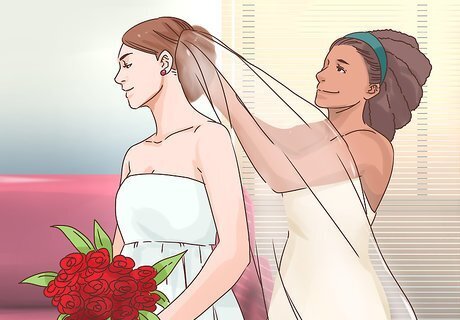
Act as the Maid of Honor. The Maid of Honor usually has more duties than a bridesmaid. This person will help the bride organize the bridesmaids dresses, host the bachelorette party, and attend the bride’s dress fitting. Be sure to talk to the bride about other specific duties she may want you to do. Other tasks can include: Signing the marriage license as a witness Holding the bride’s bouquet during the vows Giving a toast after the ceremony
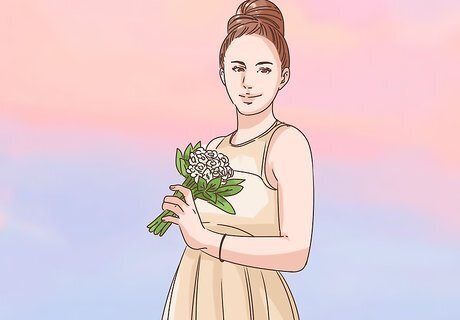
Be a bridesmaid. Bridesmaids usually don’t have any specific duties. However, make an effort to be helpful and attend any events that the bride asks you to attend. Additionally, you may have to buy your own bridesmaid dress. Other obligations can include: Assisting with the wedding planning Attending the bachelorette party Assembling party favors for the wedding guests

Act as the Best Man. The Best Man has more responsibilities than the other groomsmen do. Usually, the best man plans the bachelor party and pays for the groom’s food and drinks. Make sure to talk with the groom about any other specific duties you may have. These duties can include: Holding the rings before the ceremony Driving the groom to the wedding location Dancing with the Maid of Honor

Be a groomsman. The groomsmen don’t usually have any specific responsibilities. However, be as helpful as you can to the groom, especially when setting up for the wedding. Additionally, you may be asked to chip in money for the bachelor party. Other duties can include: Paying for your own suit rental Ushering older guests to their seats Decorating the honeymoon getaway car
Attending a Wedding

Dress appropriately. Most weddings have a dress code. If you don’t follow the dress code, you risk looking sloppy and underdressed. Look on the invitation for the dress code. If you don’t see one, talk to the bride or groom’s family. Black Tie events are very formal. Women wear long dresses and men wear tuxedos. Wear cute cocktail dresses or a dress shirt and nice pants to a Semiformal event. If you attend a Dressy Casual event, wear a fun dress or a nice shirt and pressed jeans.
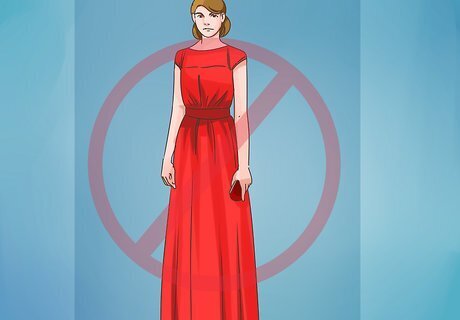
Avoid wearing offensive colors. Different cultures have different rules about what’s appropriate to wear to a wedding. Follow these rules as best you can. If you aren’t sure what colors you can wear, contact the bride or groom’s family for advice. For example: In the U.S., it is rude to wear white to a wedding if you’re not the bride. When attending an Indian wedding, avoid wearing black, white, or red. Only the bride should wear red at a Chinese wedding.
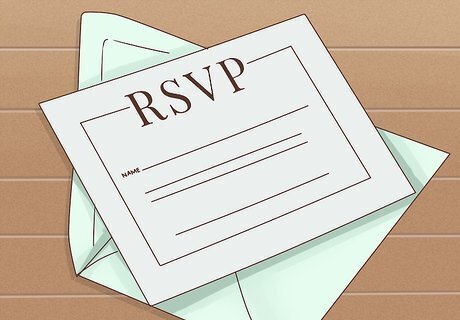
RSVP for the wedding. If the wedding invitation included an RSVP, make sure to use it. The bride or groom’s family will be keeping track of the RSVP’s and using this information for budget planning. If you don’t send the RSVP, you may not be able to attend the wedding. If you lose the card, contact the bride or groom’s family for help.













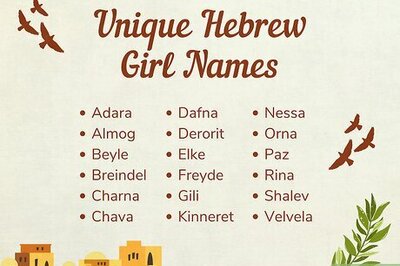


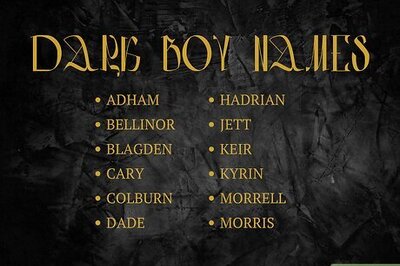
Comments
0 comment